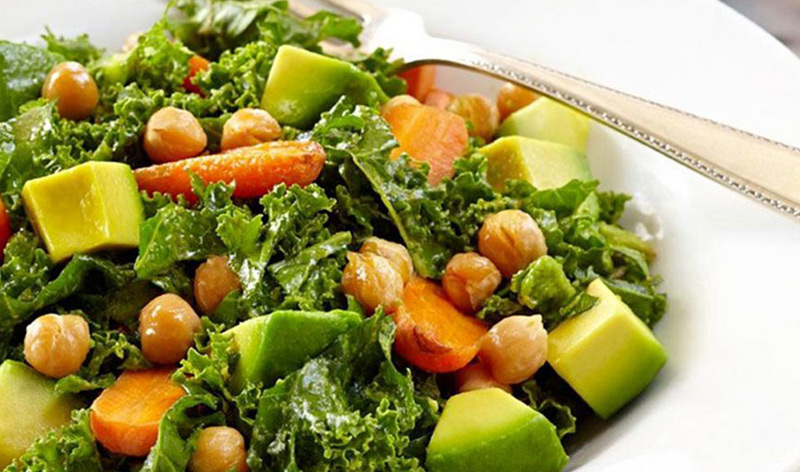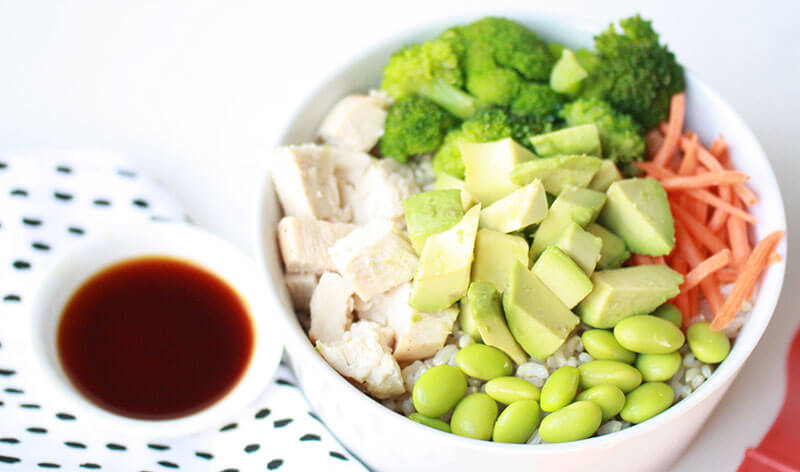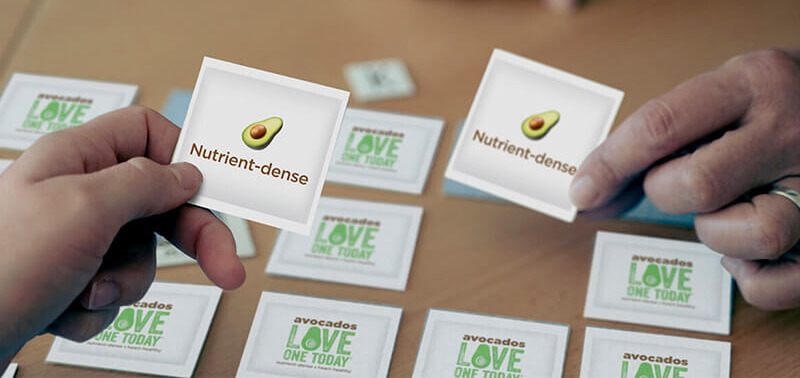Avocados are more than a delicious addition to your meals—they offer nutrients that support brain health from childhood through older adulthood. Because they contain nutrients that promote steady energy and protect against oxidative stress, such as fiber, vitamin C, and vitamin E, avocados fit seamlessly into eating patterns like the Mediterranean and MIND diets.
Key Takeaways:
- Support brain function: Nutrients in a 50 g serving of avocado like 3 g of fiber, 10% DV folate, 10% DV vitamin E, and 6% DV potassium, can help contribute to memory, focus, and learning.
- Protect brain cells: Antioxidants in avocados — such as 4% of the DV for vitamin C, 6% of the DV for vitamin E, and 136 micrograms of lutein per serving — may help protect the brain from damage caused by free radicals.
- Fit into healthy diets: Avocados can be included in the Mediterranean and MIND diets, both linked to slower cognitive decline.
- Easy to add: Avocados can be swapped for popular spreads, mixed into salads, smoothies, and eaten as snacks for everyday meals that may help support brain health.
Discover recipes and tips from Love One Today to enjoy avocados while supporting your brain health.
Avocados are more than just a tasty topping for your toast or tortilla — they also provide nutrients that can support your brain. From strengthening the structure of brain cells to protecting them from oxidative stress, the nutrients in avocados can help contribute to the health and wellness of your brain. Eating avocados along with a balanced diet may help your mind stay nimble. Let’s break down the different nutrients in avocado that help support comprehensive brain health.
What We Mean by “Brain Health”
Brain health encapsulates a full range of mental abilities that help us navigate daily life. These abilities work together to shape how we learn, adapt, and make decisions — and they matter at every stage of life. While the brain naturally changes over time, supporting its function can help us stay sharp and engaged for longer.
Cognitive Skills: Memory, Learning, and Problem-Solving
Memory and learning are closely connected. Memory allows us to encode, store, and retrieve information, while learning enables us to take in new ideas and apply them in different situations. Together, these abilities provide the foundation for problem-solving and reasoning. Strong memory and learning skills have clear benefits in daily life: improving memory and problem-solving can lead to better performance on everyday tasks at home, work, or school.
Whether it’s as simple as remembering a recipe while cooking or as complex as troubleshooting a work issue or studying for an exam, these cognitive skills shape how we approach everything.
Executive Function: Planning, Focus, and Judgment
Executive functions are the brain’s management system — a set of mental skills that help us stay organized, concentrate, and make good decisions. They enable us to perform routines, hold goals and information in mind, resist distractions, consider the consequences of our actions, and plan for the future. In practice, this includes creating a schedule (and sticking to it), filtering out interruptions when working toward a goal, and weighing pros and cons before making a choice. Strong executive function underpins productivity and error prevention by helping us regulate our behavior. Robust executive function helps us adapt when circumstances change. In other words, it allows us to be flexible and resilient.
Cognitive Vitality: Brain Health at Every Age
Brain health is important for everyone — not just older adults. Cognitive health describes the ability to think, learn, and remember clearly, which is needed to carry out everyday activities effectively at any age. In children and teens, healthy brain development supports learning and even creativity, setting the stage for success in school.
Indeed, early cognitive and social development (often measured by school readiness) can have long-term effects on a child’s academic achievement, health, and overall quality of life. Throughout adulthood, maintaining strong cognitive skills helps one stay focused, adaptable, and efficient both at work and at home. For older adults, declines in thinking skills can make everyday tasks like driving, managing bills, or taking medicine much more difficult.
How Food Shapes Brain Structure and Function
What you eat may affect your brain’s structure and function. Our body absorbs the nutrients in our food, using them to stimulate the growth of new brain cells and maintain the integrity of existing brain cells. They also help keep cell membranes flexible and provide energy for the chemical processes that allow neurons to communicate. Healthy fats support cell membrane integrity, while antioxidants from plant foods may help protect neurons from oxidative stress.
The brain also needs a steady energy supply to function well. Large swings in blood sugar can impact focus, memory, and mood. Balanced meals with carbohydrates, fats, and protein can support sustained mental performance.
Because of the role nutrition plays in the development and integrity of our brain health, what we eat matters at every age. In one study of 241 children, those who ate more fruits, vegetables, and home-prepared meals at 6 and 12 months old scored higher on IQ and memory tests at age 4. At the other end of the lifespan, a study of 3,000 older adults by the National Institute of Aging found that following at least four healthy habits—including the MIND diet—was linked to a 60% lower risk of Alzheimer’s disease. Your brain needs the right nutrients to do its best, whether you’re entering kindergarten or retirement.
For older adults, there are two main diet plans that are linked to cognition: the Mediterranean diet and the MIND diet. Let’s learn more about them.


The Mediterranean Diet and Cognitive Protection
The Mediterranean diet mimics the traditional eating patterns of countries bordering the Mediterranean Sea. It emphasizes vegetables, fruits, whole grains, and legumes. It prioritizes the healthy fats found in nuts, seeds, fish, and olive oil, while limiting red meat, processed foods, and added sugars.
This way of eating has been suggested to be linked to better brain health, including slower cognitive decline and lower rates of dementia in older adults. The plant-based foods, healthy fats, and fish-based omega-3 fatty acids in the Mediterranean diet may support blood flow to the brain, reduce inflammation, and protect against oxidative damage — all factors that can influence cognitive performance over time. However, further research is needed to establish a causational relationship between the Mediterranean diet and cognitive health.
Avocados, as a plant-based food with 6 g of healthy fats per 50 g serving, are a natural component of the Mediterranean diet.
The MIND Diet – A Targeted Approach to Brain Health
The MIND diet, short for Mediterranean-DASH Diet Intervention for Neurodegenerative Delay, combines elements of the Mediterranean diet with the DASH diet (designed to help manage blood pressure). It specifically focuses on foods linked to better brain outcomes, such as leafy green vegetables, berries, beans, nuts, whole grains, fish, poultry, and healthy fats.
Avocados fit naturally into the MIND diet because they have 5g of monounsaturated fats per 50 g serving, vitamins, and plant compounds that may support brain function. They can be used in place of less healthful fats in recipes, making it easier to meet the MIND diet’s emphasis on plant-based sources of fat.
Incorporating avocados into meals alongside vegetables, fruits, and whole grains aligns well with the diet’s overall approach to supporting long-term brain health.
Brain-Healthy Nutrients in Avocados
Avocados contain multiple nutrients that may contribute to cognitive performance throughout life. While each nutrient works differently, together they may contribute to processes like memory, focus, learning, and problem-solving.

Dietary Fiber in Avocados
Contains: 3 g per 50 g serving
Dietary fiber supports a healthy gut microbiome — the community of microorganisms in the digestive tract — which links to brain health through the gut-brain axis. A well-balanced microbiome can help regulate inflammation and produce compounds that influence mood and cognition. Fiber also slows the absorption of sugar into the bloodstream, helping to prevent sharp rises and drops in blood sugar levels. Stable blood sugar supports consistent energy and focus, which you need for tasks requiring sustained attention.

Folate in Avocados
Contains: 10% DV per 50 g serving
Folate, also known as vitamin B9, is essential for the production of neurotransmitters, the chemical messengers that allow brain cells to communicate. It also plays a key role in brain development, particularly during pregnancy and early life. Adequate folate intake contributes to improved memory and learning ability at all stages of life, and deficiencies may impair cognitive performance.

Vitamin E in Avocados
Contains: 6% per 50 g serving
Vitamin E acts as an antioxidant, helping protect neurons from oxidative stress that can lead to cell damage over time. This protection is critical because brain cells are highly active and susceptible to oxidative injury. Vitamin E intake may contribute to a lower risk of cognitive decline.

Potassium in Avocados
Contains: 6% per 50 g serving
Potassium helps regulate nerve signaling by maintaining the electrical gradients that allow brain cells to send and receive messages. This mineral also supports cardiovascular health by helping to maintain healthy blood pressure levels. Because good blood flow is essential for delivering oxygen and nutrients to the brain, potassium-rich diets indirectly support brain function.

Lutein in Avocados
Contains: 136 mcg per 50 g serving
Lutein is a carotenoid antioxidant found in the brain and eyes, where it helps protect tissues from oxidative stress. It is involved in visual processing and has been associated with improvements in memory and processing speed. A 2017 clinical trial found that older adults who ate one avocado daily for six months had higher blood and eye lutein levels, as well as improvements in working spatial memory and problem-solving skills. As research study findings are limited, additional research is needed, especially in a larger U.S. representative population and with a longer intervention period. Nonetheless, the outcomes add to the growing research on the potential benefits of avocados and cognitive function.
How to Add More Avocados to Your Diet
Adding avocado to your daily meals can be simple, flavorful, and adaptable to almost any eating style. Whether you’re making small swaps or following a specific diet plan, avocados can fit right in.
Everyday Swaps and Upgrades
Avocado’s smooth texture makes it an excellent substitute for spreads like mayonnaise, butter, or cream cheese in sandwiches and wraps. Mashing avocado with a squeeze of lemon or lime juice creates a creamy, flavorful spread you can use for dips and sandwiches alike. You can also add avocado slices to grain bowls for a richer texture, or sprinkle chunks onto your tacos or burritos.
For breakfast, swap out butter on toast for smashed avocado topped with herbs, sliced tomatoes, or a sprinkle of seeds.
Avocados in Popular Diet Plans
Both the Mediterranean and MIND diets emphasize plant-based foods, healthy fats, and nutrient-rich produce—making avocados a natural fit. In both diets, avocados can take the place of other sources of unsaturated fats, such as in a salad dressed with an avocado vinaigrette or a sandwich that uses mashed avocado in place of mayonnaise. But avocados don’t just have to be a substitute for different foods — they can be the star of the show as well. Breakfasts, such as avocado toast with a fiber-rich bread, can highlight the creamy flavor of avocado, giving you a delicious start to your day.
Finding new ways to prepare avocados can make these diets exciting and help you stay consistent to reap the benefits.
Snack Smarter with Avocado
Avocados also make it easy to put together quick, satisfying snacks. Pair fresh guacamole with sliced bell peppers, cucumbers, or even jicama for a tropical treat. Blend avocado into smoothies for creaminess and a mild flavor that pairs well with fruit, leafy greens, or protein powders.
You can even use avocado in desserts, either baking them into your treats or using them as the base for a refreshing froyo bark.












